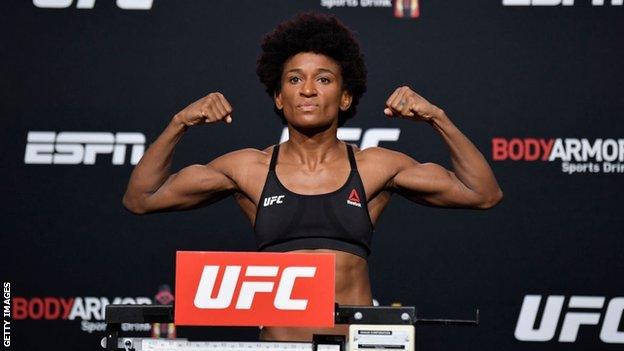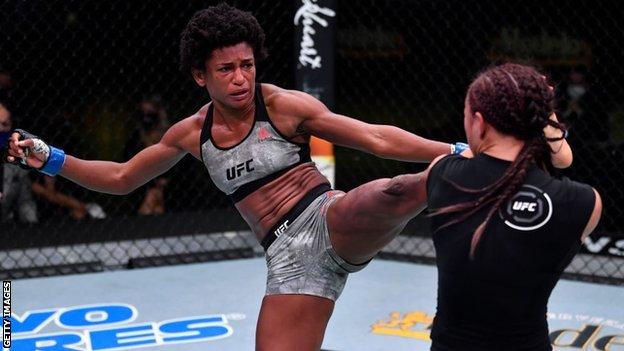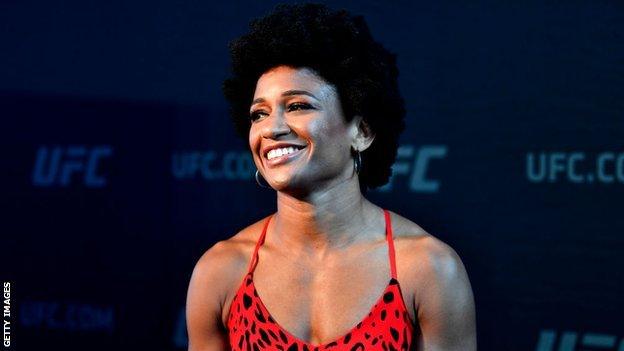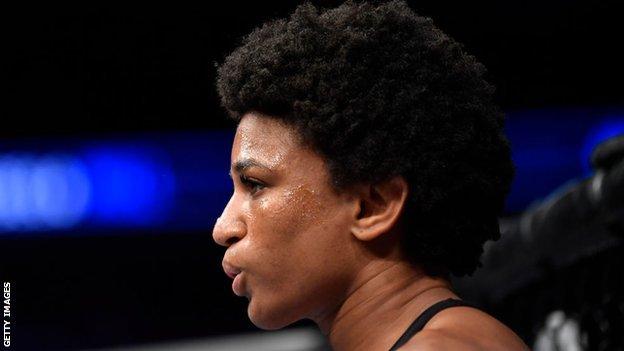UFC's Angela Hill: 'I have to hear from the people who hate me just because of the way I look'
- Published

Angela Hill was the first African-American woman to fight in the UFC
Angela 'Overkill' Hill did not mean to become one of the best mixed martial arts fighters in the world. And she never thought she would make it to the UFC.
"That was a very unattainable goal. I was just doing it to have fun and build confidence," the 35-year-old tells BBC Sport.
Hill was not always a fighter. After she graduated from art school in 2008, she worked as a bartender before getting a job as an animator. However, she hated sitting still all day, so she looked into martial arts.
"I really liked that feeling of learning self-defence but also hitting something really hard and letting out my aggression," she explains.
In 2014, Hill had built enough confidence to become the first African-American woman to fight in the UFC.
"My mom was really surprised that I stuck with it. I was just a fast learner and the rest is history," she says.
The rest really was history, and she made some of her own in September 2020 - becoming the first black woman to headline a UFC event.
Hill's manager posted a picture of her on Instagram to celebrate the moment.
Allow Instagram content?
This article contains content provided by Instagram. We ask for your permission before anything is loaded, as they may be using cookies and other technologies. You may want to read Meta’s Instagram cookie policy, external and privacy policy, external before accepting. To view this content choose ‘accept and continue’.
"I already knew the amount of hate I'd get just for acknowledging that, so I didn't even want to post it," says the former Invicta FC champion. "After a few days I was like: 'I'm not gonna let them ruin this moment.' So I posted it but turned the comments off.
"You still see the messages, the hate, the messages on my manager's page saying: 'Why does this matter?' The real question they should be asking is: 'Why does it matter so much to you to deny it?'"
After eventually resharing the photo, Hill could not look at her phone for two weeks.
"It sucked because fight week is usually a really nice time and I'll see lots of messages of encouragement, " she says. "Now it's more of a work platform to promote my brand, so I have to hear from the people who hate me just because of the way I look.
"It's part of my motivation to prove those guys wrong."
Although a moment that should have been one of celebration was tainted, Hill, now ranked number 12 in the women's strawweight division, still managed to look at the positives of what she had accomplished.
"It's not until I see messages from little black girls, or any girl who's inspired by me, that it really sinks in," she says.

Angela 'Overkill' Hill holds the record for the most fights in UFC women's strawweight history, with 16
Hill was beaten by opponent Michelle Waterson. "I feel like I haven't fully accomplished what I set out to do and it's annoying because it was such a big milestone," says Hill.
"But it's not going to be the last thing I accomplish to make history. I'm really driven to keep pushing that ceiling."
And it is just as important for Hill to push that ceiling for others. She wants people to follow in her footsteps so her sport can continue to become more diverse.
"The more talent that's in MMA, the better it's going to be. MMA is the perfect example of a culture of diffusion, where you have people who are learning martial arts from every different country. Like Brazilian jiu jitsu, judo, taekwondo, Muay Thai - these are all different practices from all around the world," she says.
"If you don't have people from different walks of life and different backgrounds, you're never going to get that full talent pool and the competition would just stay stagnant."

Hill is one of five black women fighting in the UFC
But when there are so few people who look like you in your sport, there are challenges too.
As well as the racist and sexist online abuse, Hill has experienced racist stereotypes throughout her fighting career. One of those - that she says is prevalent in all sports - is when black athletes' skills are not recognised.
"It's hard to get past. People talk about your physique and they never compliment your technique, your slickness or your ability to absorb knowledge," says Hill.
"That can feel very patronising. You don't feel like you're being as respected as much as your other training partner."

Hill is a former World Kickboxing Association champion
Since the death of George Floyd in May, Hill has been speaking out about racism and the fight for racial equality in the United States.
Named after civil rights activist Angela Davis, Hill says learning about black history and the stories of Rosa Parks, Harriet Tubman and so many others was an integral part of her childhood.
"It couldn't not be," she adds. "They were always stories of inspiration. People who stood up for themselves, who led a march, who ended up getting killed for my right to do what I wanted to do 50 years later.
"All of that is really inspiring to me. I was given this opportunity by my ancestors to live as freely as I do. I don't want to waste that opportunity because so many people died just for the possibility for me to walk around freely and marry who I want to marry. I've never missed an election - because people died so that I could vote."
Hill believes the resurgence of the Black Lives Matter (BLM) movement this summer has reinvigorated a sense of black pride that she thinks many people have been afraid to show and feel.
"When all these huge marches started happening, and BLM became such a huge thing, it was surprising but also really nice to feel heard for once when, for so many years, we've felt like protesting has fallen on deaf ears. It's like the bubble finally popped and everyone has to talk it out," she says.
"For me, Black Lives Matter is an idea. It's saying equality isn't happening right now but it can be achieved, and that's all it is to me."

No Passion, No Point: Gary Lineker joins Eddie Hearn
The Likely Dads: New comedy on all things fatherhood
